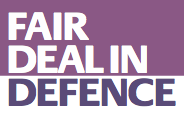A
key objective of our Fair Deal campaign is to stop privatisation in the Ministry
of Defence and to review all previous transfers of work. In our recent consultative
ballot, 98% of members agreed with our fight against privatisation.
History
has shown us that our job security, pay and terms and conditions are all under
threat following privatisation. Since the 1980s the
UK’s public services have been under constant threat from privatisation,
despite growing evidence that it leads to worsened services, higher costs,
fatter profits and a greater risk of failure.
This political ideology
has seen the energy and transport sectors deregulated, resulting in continuing price
rises well in excess of inflation. While the Private Finance Initiative (PFI) sees
areas such as the NHS, education and our own department locked into 20 - 30 year contracts, with taxpayers
stuck with huge, on-going spending commitments – often for items, sites or
services that are no longer required.
However,
just like the casino bankers who caused the financial crisis, the risks associated
with PFI have not transferred to the private sector. The UK taxpayer bails out
PFI failures (of which there are an increasing number) as essential public
services cannot be allowed to fail. Like the major banks, it would be
impossible to conceive of an NHS Trust or school being allowed to go under.
MoD privatisation
We
have seen more than our fair share of privatisation in our department. Introduced
as part of moving from a provider to a decider role, the outcome has been to
lose our ability to act as an intelligent customer and to hold companies to
account. This puts providers in a ‘no lose’ situation, charging exorbitant fees
to support the front line.
The
sale of the Defence Evaluation and Research Agency is the most glaring example
of dubious privatisation. The setting up of a public/private partnership called
QinetiQ made 10 senior civil servants multi-millionaires, as their total
personal investment of £540,000 turned into £107 million, whilst a National
Audit Office review concluded that the taxpayer lost “tens of millions” on the
sale.
Failure follows failure
Europe’s largest IT privatisation, the Defence Information
Infrastructure project (DII), was predicted to cost £2.3bn over 10 years. Since
then, costs have risen to some £10bn, or £1bn a year, for a service that is
barely adequate running software described as ‘the least secure on the planet’
(Internet Explorer 6, launched in 2001). As you wait to log on in the morning,
browse the internet, or save a file, you can decide whether the service we get
from DII is worth nearly £3M a day.
After
the G4S failure at the Olympics, where our armed forces had to step in to save
the day, we might have thought that privatisation would have had its day. But
some in MoD persevere, with the latest proposal being the planned privatisation
of Defence Equipment and Support (DE&S). Our union believes the GoCo
proposals will be costly and extremely risky, with the potential of conflict of
interests with major suppliers and our international partners being unwilling
to share their technical knowledge, specifications and classified information with
a privatised DE&S.
Pensions and Privatisation
Every
time the value of our pension decreases, a private company bidding for MoD work
will not need to bid as much to take over that work. So, for example, at Abbey
Wood we estimate that staff there have lost over £14M from the value of their
pensions in the current year alone. Thus any company bidding to take on the
proposed GoCo will be getting a workforce at £14m cheaper than last year.
Conclusion
Privatisation
of defence services has failed. Costs and risks have increased, while
contractors have grown fat on regular contracts and payments from the MoD.
While for staff, time and time again privatisation leads to lower pay, worsened
job security and a degradation of terms and conditions.
The
Ministry of Defence has become more and more dependant on the private sector
supporting the front line, with no fall back capability should things go wrong.
We
believe its time to look again at whether privatisation is the answer and to
review all existing and proposed contracts to ensure that they are delivering
for defence.
By
voting YES/YES in our statutory ballot, we can send a powerful message that
privatisation should be taken off the agenda in our department, whilst those staff
who remain committed to supporting defence should be guaranteed a Fair Deal.
